Top Ten Performances of 2022
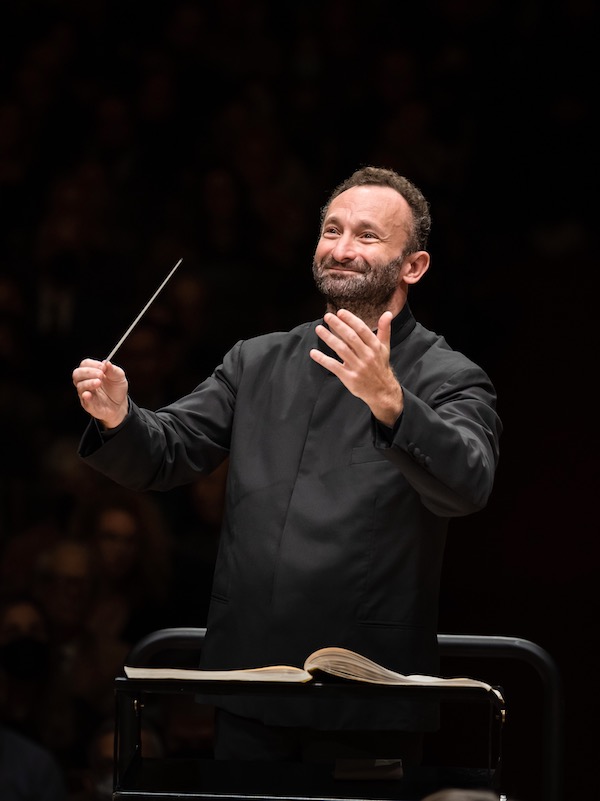
Kirill Petrenko led the Berlin Philharmonic in November at Symphony Hall. Photo: Berlin Philharmonic
1. Music by Korngold, Mozart and Andrew Norman. Kirill Petrenko/Berlin Philharmonic Orchestra
The Berlin Philharmonic’s visits to Boston haven’t once, in this century at least, disappointed. November’s performance, which marked the local debut of the BPO’s new music director, Kirill Petrenko, maintained that trend. The offbeat program of music by Andrew Norman, Mozart, and Erich Wolfgang Korngold was enticing by itself. But the ensemble’s playing—flexible, virtuosic, impassioned, perfectly balanced—was simply in a class of its own. Combine this with an interpretive conviction that culminated in a revelatory rendition of Korngold’s unjustly neglected Symphony in F-sharp and we have, by a long shot, the best performance of 2022.

Zlatomir Fung performed Elgar’s Cello Concerto with Benjamin Zander and the Boston Philharmonic Youth Orchestra in February Photo: Hilary Scott
2. Music by Ravel, Elgar, and Shostakovich. Benjamin Zander/Boston Philharmonic Youth Orchestra
On rare occasions, a concert program seems to respond perfectly to current events. So it was in February, just days after Russia invaded Ukraine, when the Boston Philharmonic Youth Orchestra showed up at Symphony Hall to perform three pieces written in the shadow of war and political oppression.
That lineup of Ravel’s La valse, Elgar’s Cello Concerto, and Shostakovich’s Symphony No. 5 would have been musically strong in quiet times. On this Sunday afternoon, though, all that rumbles beneath the surface of this repertoire—intimations of sorrow, anger, irony, joy, violence, anxiety, grit, determination—took on harrowing immediacy. The BPYO’s was a performance of urgency and purpose, one that melted away the distance of years to reveal the tragic (but strangely comforting) threads of suffering, hardship, and loss that bind generations together.
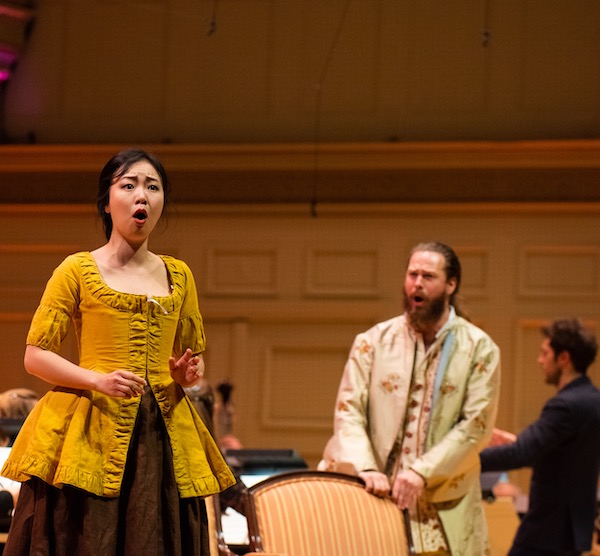
Ying Fang as Susanna and Cody Quattlebaum as the Count with Raphaël Pichon conducting the Handel and Haydn Society in Mozart’s The Marriage of Figaro at Symphony Hall. Photo: Sam Brewer
3. Mozart: The Marriage of Figaro. Raphäel Pichon/Handel and Haydn Society
This was a big year for the Handel and Haydn Society. Artistic director Harry Christophers stepped down in May after 13 seasons and, in November, Jonathan Cohen was appointed his successor, effective next fall. The year was crowned in effervescent style with a spectacular performance of Mozart’s greatest opera. Everything about the undertaking worked, the cast was superb, and Raphäel Pichon conducted with style and energy. The minimalist staging conveyed exactly what was needed to illustrate the drama and never got in the way of the story. Ultimately, this was a semi-staged concert production that did more to illuminate the freshness of Mozart’s music and the timeless brilliance of Lorenzo da Ponte’s insightful libretto than many full-on opera-house versions.
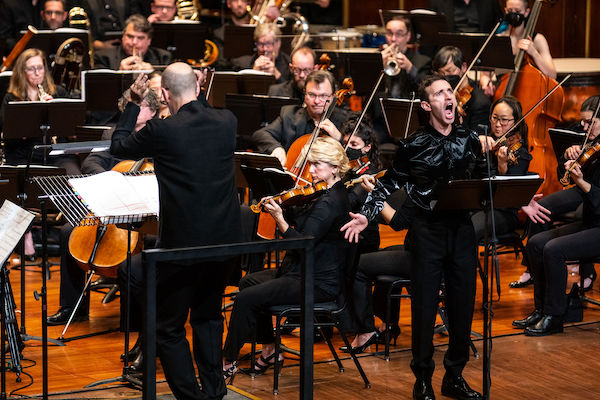
Anthony Roth Costanzo as Dionysus in John Corigliano’s The Lord of Cries with Gil Rose conducting Odyssey Opera. Photo: Robert Torres
4. Corigliano: The Lord of Cries. Gil Rose/Odyssey Opera
Odyssey Opera has certainly made waves over its first nine years. The East Coast premiere of John Corigliano’s long-awaited second opera, presented in conjunction with the Boston Modern Orchestra Project, ranks among its most compelling efforts. A merging of Euripides’ The Bacchae with Bram Stoker’s Dracula, the plot is a touch convoluted and its moral (subjugating any sort of desire is bad) a bit one-dimensional. Regardless, the story has drawn out some of the best music Corigliano has ever written, while Mark Adamo’s libretto, despite its occasional holes, is, overall, well-judged and articulate. In this performance, again, everything—a uniformly terrific cast, chorus, and orchestra—held a packed Jordan Hall rapt for nearly three hours.
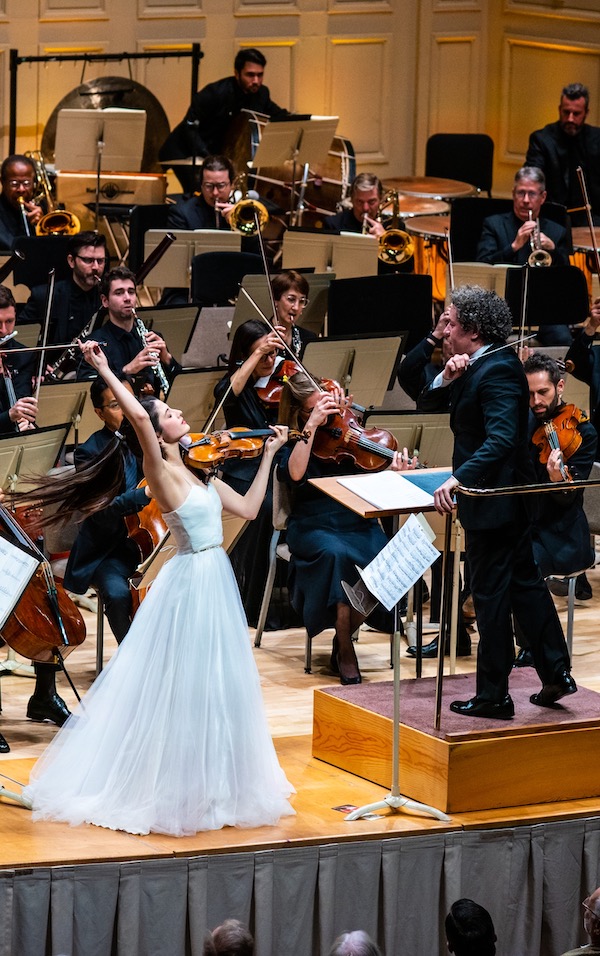
Violinist Maria Dueñas performed Gabriela Ortiz’s Altar de cuerda with Gustavo Dudamel and the Los Angeles Philharmonic. Photo: Robert Torres
The Los Angeles Philharmonic’s latest visit to Boston was a true “event.” There was the engaging debut of violinist Maria Dueñas in Ortiz’s ear-catching new concerto. The performance of Mahler’s Symphony No. 1, despite some quirky interpretive choices by Gustavo Dudamel, flowed and was exceedingly well-balanced. And a riotous encore found Johann Strauss wandering the byways of Caracas. Suffice it to say, this is an orchestra that is perfectly and rightly comfortable in its own skin.

Aliana de la Guardia (here with saxophonist Philip Stäudlin) portrayed Rose Standish Nichols in Beth Wiemann’s I Give You My Home, presented by Guerilla Opera. Photo: Timothy Gurczak.
6. Wiemann: I Give You My Home. Guerrilla Opera
For fifteen years and counting, Guerrilla Opera has quietly but steadily worked to establish a niche for experimental opera in Boston. This spring’s captivating world premiere—a site-specific retelling by Beth Wiemann of the life and times of local feminist icon Rose Standish Nichols—reminded that cutting-edge art need not be overly esoteric and can, indeed, possess a warmly-beating heart.
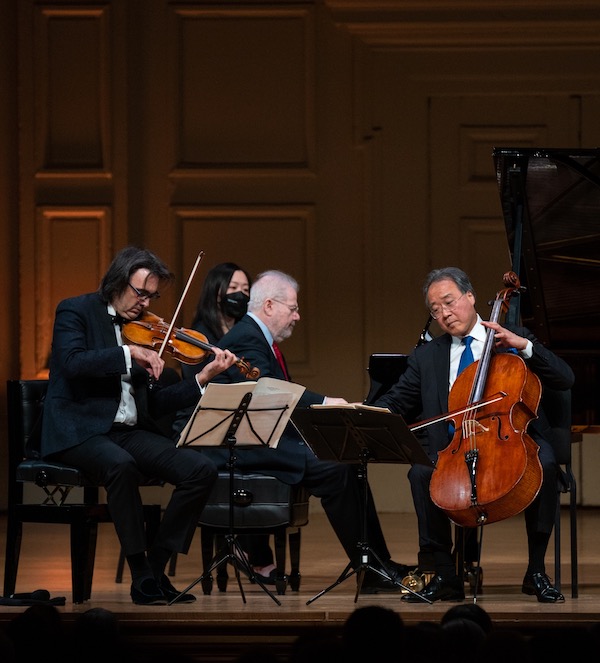
Leonidas Kavakos, Emanuel Ax and Yo-Yo Ma performed music of Beethoven for the Celebrity Series. Photo: Robert Torres
7. Beethoven Piano Trios. Leonidas Kavakos, Yo-Yo Ma, and Emanuel Ax
Leonidas Kavakos, Yo-Yo Ma, and Emanuel Ax are musicians you can pretty much set your watch by. But that doesn’t mean they ever settle for less than their best, as this program of two Beethoven piano trios plus a chamber-sized arrangement of the Sixth Symphony demonstrated.
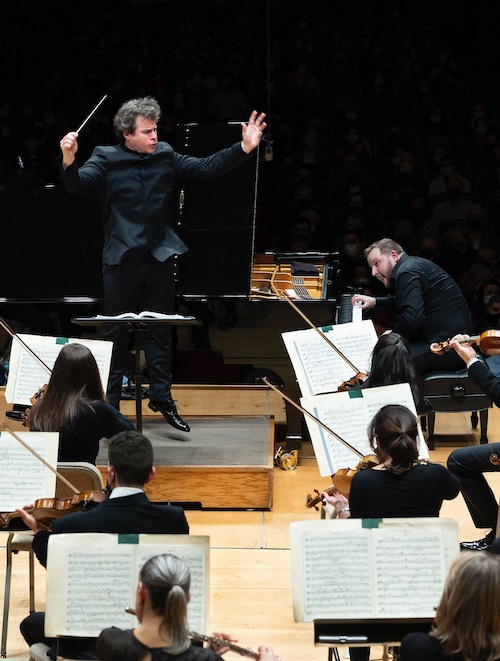
Jakub Hrůša conducted the Boston Symphony Orchestra with Lukáš Vondráček as soloist in Rachmaninoff’s Piano Concerto No. 2 in February. Photo: Winslow Townson
8. Music by Janáček, Rachmaninoff and Dvořák. Jakub Hrůša/Boston Symphony Orchestra
The ongoing pandemic necessitated a programming change in Jakub Hrůša’s highly-anticipated return to the BSO last February. Leoš Janáček’s Glagolitic Mass was out. In its place was that composer’s tone poem, Jealousy, as well as Rachmaninoff’s Piano Concerto No. 2 and Dvořák’s Symphony No. 6. The latter, in particular, played to the Czech conductor’s strengths which, in turn, resulted in a reading of uncommon warmth and charisma from the BSO. Hrůša’s European schedule is packed (he takes over the leadership of the Royal Opera House, Covent Garden in 2025) but, if time allowed, he’d make an ideal principal guest conductor at Symphony Hall.
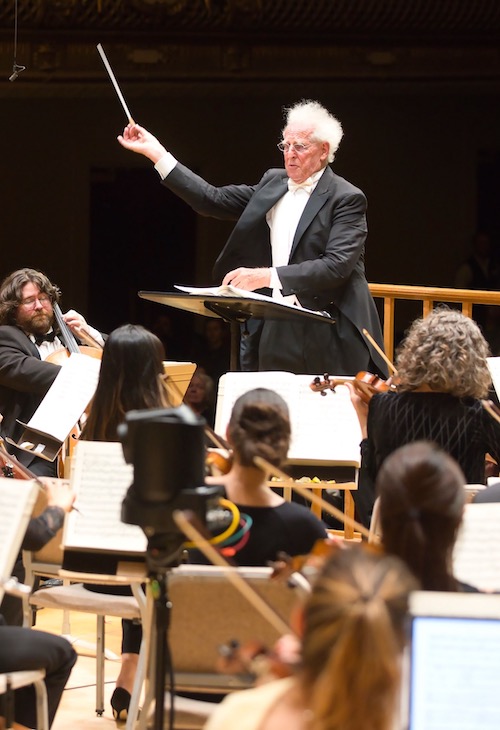
Benjamin Zander conducted the Boston Philharmonic in Rachmanioff’s Symphony No. 2 in October. Photo: Hilary Scott
The Boston Philharmonic came roaring back from its pandemic hiatus last fall and did not pause in 2022. Its accomplishments this year were several, including a powerful Mahler Third Symphony in April and a dancing Brahms Second in November (the last marked the 50th anniversary of BPO music director Benjamin Zander’s debut as a conductor). But their October performance of Rachmaninoff’s Symphony No. 2—heard alongside Beethoven’s Piano Concerto No. 4, with the exceptional Jonathan Biss taking the solo spotlight—brought a piece that can feel stuffy and verbose fully to life. This was, for once, a Rach Two that could have been played twice in succession without getting a complaint from a soul in a nearly sold-out Symphony Hall.
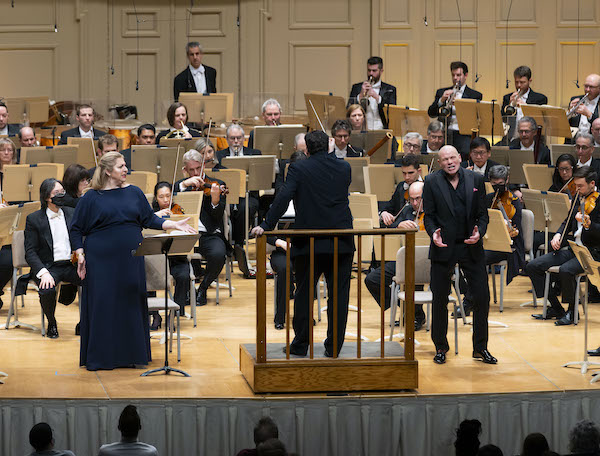
Andris Nelsons conducted the BSO in a March concert performance of Berg’s Wozzeck with Bo Skovhus and Christine Goerke. Photo: Winslow Townson
10. Berg: Wozzeck. Andris Nelsons/Boston Symphony Orchestra
Andris Nelsons’ strengths as a conductor—he’s a particularly persuasive advocate for new music and Slavic fare—extends to opera, though it’s been some time since Boston audiences have gotten to hear him in that capacity. The performances of Alban Berg’s Wozzeck that he led at Symphony Hall in March (later taken to Carnegie Hall) confirmed the impression that the conductor, when in his element, remains formidable indeed.
True, there were unavoidable balance issues, but what sumptuous, characterful playing the BSO delivered. Taken together with Bo Skovhus’s harrowing, near-sympathetic portrayal of the doomed title character, this was one of the high points of Nelsons’ Boston tenure.
Honorable Mention
Collage New Music’s semicentennial season started off in bracing fashion with a mix of premieres (including a haunting new John Harbison song cycle) and revivals. Though Boston may not consistently advertise itself as such, it’s long been a hotbed for contemporary music—and in no small part thanks to groups like CNM.
Tchaikovsky Seconds
Though Tchaikovsky’s music is something of a Boston Symphony staple, his lesser-known fare isn’t too frequently revived. Yet, twice this year, the orchestra revisited rarities by the Russian master and the results were electrifying.
Both events also involved conspicuous debuts. The first, in January, featured the initial local appearance of conductor Elim Chan. Her account of the Second Symphony was nothing short of exhilarating: too easily this piece can descend into bombast and caricature. That it didn’t here reflected the conductor’s exceptional command of the music’s structure as well as Chan’s rapport with the orchestra: it’s not too much to say that her presence on the podium resulted in some of the BSO’s most attentive playing in recent memory.
Three months later, BSO assistant conductor Anna Rakitina made her subscription series debut conducting Tchaikovsky’s Piano Concerto No. 2 with Alexandre Kantorow (who was making his own BSO debut) as the soloist. Fireworks ensued. Perhaps an even more fiendishly challenging score than the much-loved First Concerto, the Second emerged here as music of inviting quirkiness and originality. Everyone involved, on stage and in the hall, responded to it with alacrity. If one needed yet more evidence that non-canonic warhorses are viable, well, here you had it.
Best Premiere(s)
The Boston Symphony Orchestra’s commitment to new music this year was mostly limited itself to curtain-raisers, an understandable if mildly frustrating tack. While many of those didn’t stick long in the memory, Jessie Montgomery’s Rounds most certainly did.
True, her contribution was more a pocket-sized concerto for piano and strings than an overture. But everything about the effort—the organization of thematic materials, clarity of structure, inventive handling of the small ensemble—felt, for lack of a better word, inevitable. It didn’t hurt, either, to have Awadagin Pratt, in his belated BSO debut, taking up the solo part, but Montgomery was the star of this show.
Simon’s gripping score for chamber ensemble and narrator impressed in its debut recording this past summer. Its local premiere at the Gardner Museum in October was equally compelling. A 45-minute-long meditation on the lives of 272 slaves sold by priests at Georgetown University to sustain the school’s financial situation in 1838, the score draws almost equally on jazz, hip-hop, Catholic liturgical, and Black Protestant musical traditions. As with Montgomery, we’ve got what seems to be another major young compositional voice confidently stepping out into his moment.
Most Auspicious Debut
Bass-baritone Dashon Burton’s delayed Celebrity Series recital debut was worth the wait. A short affair (the program only ran about an hour), its meditations on life, death, belief, doubt, and relationships by Bach, Brahms, Fauré, and Margaret Bonds had a thematic urgency that matched the moment. As great a singer as Burton demonstrated himself to be, his appearance revealed, more significantly, an artist whose grasp of the music goes far beyond just knowing and burnishing the notes.
Most Inauspicious Debut
It’s no secret that Boston is a tough town for opera companies. Unfortunately, that awareness seems to hang all too heavily over Boston Lyric Opera, whose recent efforts at relevance have led it all over the map–and sometimes completely off of it.
The low point–one hopes–was reached in September with Yuval Sharon’s ridiculous staging of Giacomo Puccini’s La bohème that presented the opera in reverse, starting with Act 4 and ending with Act 1.
That such an approach showed absolutely no regard for the musical construction of Puccini’s score and served to make the opera’s characters even more one-dimensional than usual seems to have bothered no one. Then again, neither did the necessity of inserting a superfluous narrator whose help is required to guide the audience through the production’s tangled skein of preposterousness. The narrator’s monologue consisted chiefly of a series of inane questions about alternatives to the opera’s plot. These were evidently meant to lend the presentation the veneer of runic profundity but, instead, gave this whole trainwreck a facepalm-inducing comic aspect.
Sharon’s production made one long, more than ever, for decisive, rather than reactionary, artistic leadership from the company. Until that happens, it was possible to resonate, more than usual, with the sentiments of my seatmate: “You know what the best thing is about Bohème?” she offered. “It’s short.”
Posted in Articles